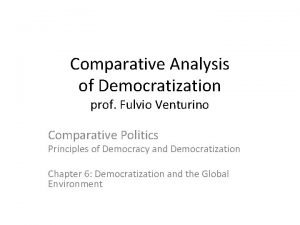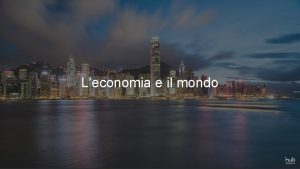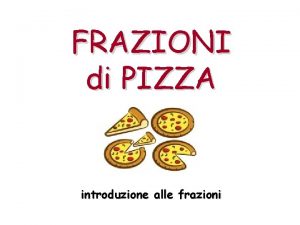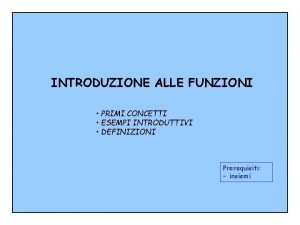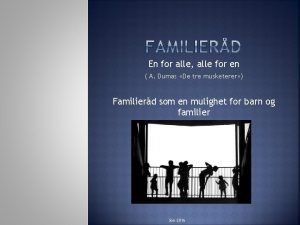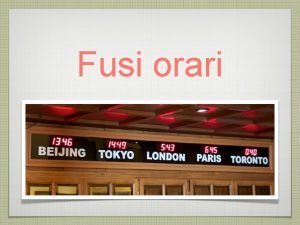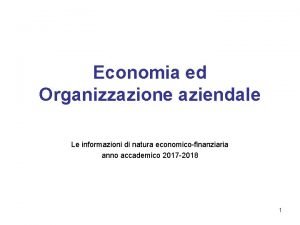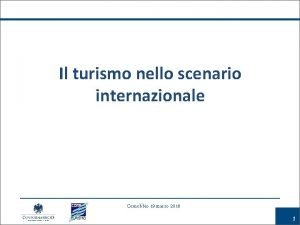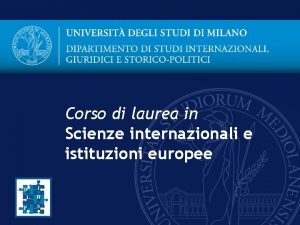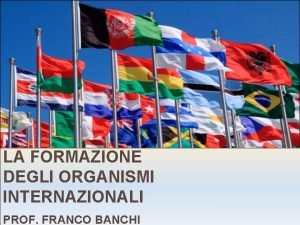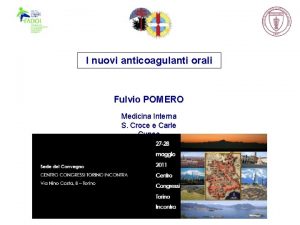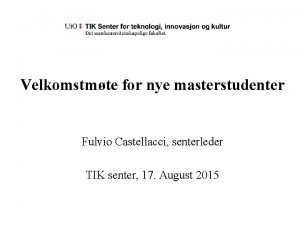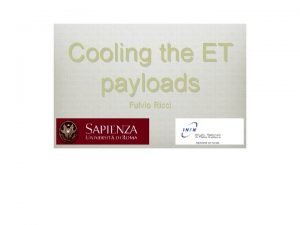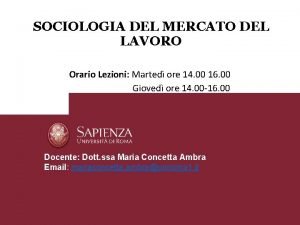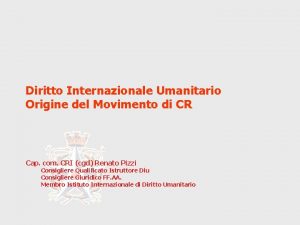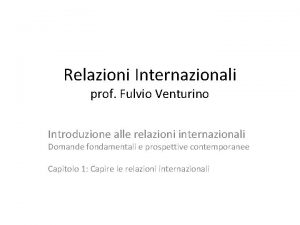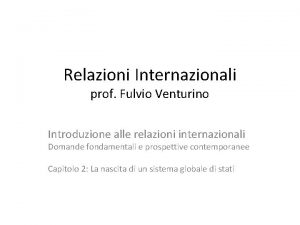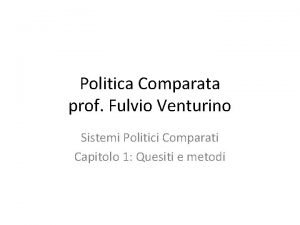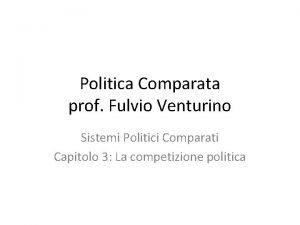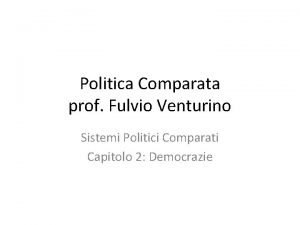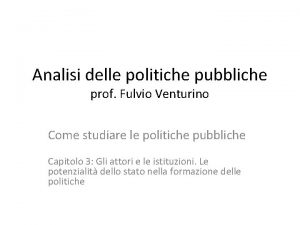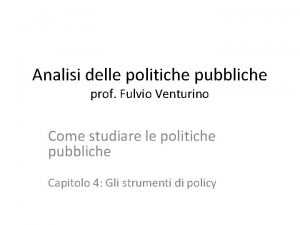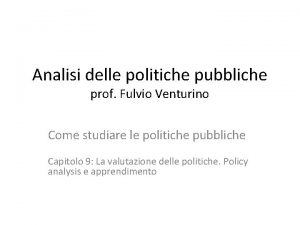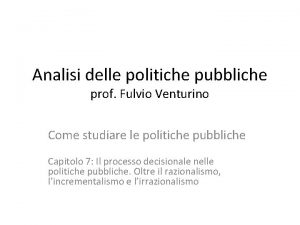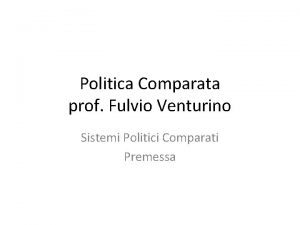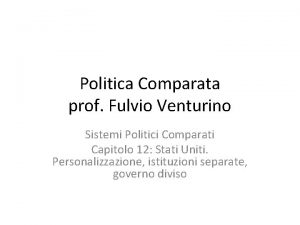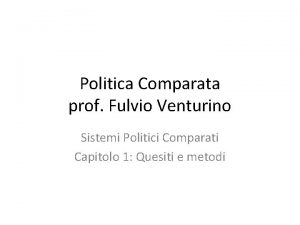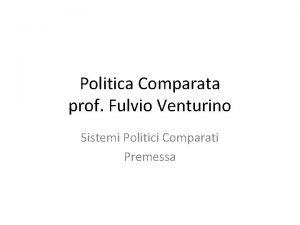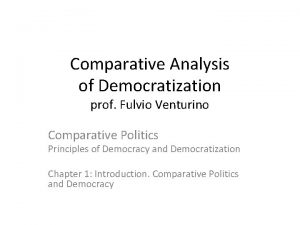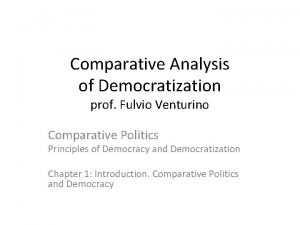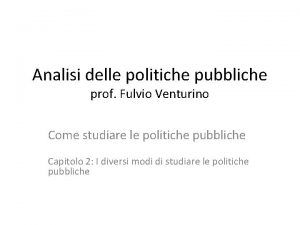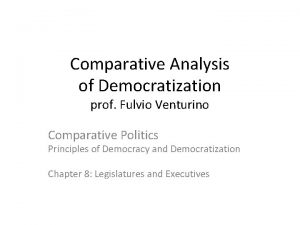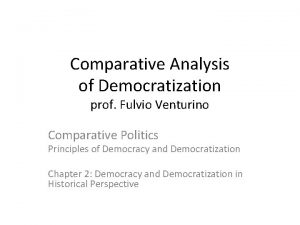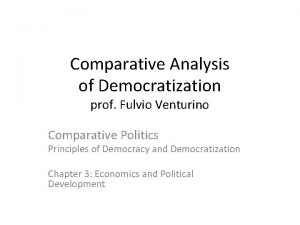Relazioni Internazionali prof Fulvio Venturino Introduzione alle relazioni























- Slides: 23

Relazioni Internazionali prof. Fulvio Venturino Introduzione alle relazioni internazionali Domande fondamentali e prospettive contemporanee Capitolo 3: Teorie delle relazioni internazionali

Theoretical traditions in international relations 1. 2. 3. 4. 5. The Realist Tradition The Liberal Tradition The Marxist Tradition The Constructivist Tradition The Feminist Tradition

Realist assumptions • States are the main actors in international relations • States are reasonably rational actors • States exist in a world where no higher authority can enforce rules or order • Security is the central problem of international politics • Competition and conflict are inherent in world politics

Realist propositions • States aim to a balance of power, a situation of rough equality of power between the major states in the international system • States will respond to threatening situations by forming alliances • States care deeply about relative gains or relative position • Realists also focus on the problem of the rise and decline of states • Nationalism is a force that motivates states on the international stage

The English School of International Relations • States share an interest in establishing rules of the game in three areas – restraints on the use of force – sanctity of international agreements – the security of property rights • As a consequence, an ‘International society’ arises with a wide array of norms, rules, and institutions that reflect and guide relations among states

The realist tradition Levels of analysis

Liberal assumptions • The world is in an ongoing process of modernization • Individuals and groups, not states, are the basic actors in international relations • There is always ample room for individuals and groups to look for ways to advance their interests through cooperation • Through trade, exchange, innovation, and learning, all societies will tend to move in the direction of liberal democracy and capitalism • Liberals assume that progress has in fact occurred

Liberal propositions • Commercial liberalism: market society and economic interdependence tend to have a pacifying impact on relations among states • Democratic peace: democracies tend not to fight each other • Liberal institutionalism: states build international relations around international law and institutions • Transnationalism: groups within countries build cooperative associations with groups in other countries • Cosmopolitanism: peoples in different countries to embrace each other as fellow global citizens

The liberal tradition Levels of analysis

Marxist assumptions • Politics is shaped by the deep underlying forces of capitalism • Social classes are the actors that shape politics and international relations • The modern state is ultimately organized to serve the interests of the capitalist class • Societies are expected to become increasingly divided between two classes • Revolution is the dominant mode of political change

Marxist propositions • States in the advanced industrial countries act to advance the interests of the capitalist class • Business wields two types of influences on foreign policy – structural: states autonomously pursue policies that protect the interests of capitalism – instrumental: the active lobbying of businesses influences what states do • Transnational business are a salient feature of world politics

The Marxist tradition Levels of analysis

Constructivist assumptions • Interests are shaped by the identities of actors • Identities emerge from interplay of real world settings and the evolving ideas and beliefs inside the heads of people • Elite individuals in both society and the state are the most important actors • Communication plays an important role in shaping and changing identities

Constructivist propositions • The world is anarchical, but anarchy is shaped by how people think about it • Global civil society provides the communication networks through which elites develop ideas and identities that shape state policy and the character of anarchy • Learning and socialization that takes place across the global system does tend to move the world in a progressive direction • Leaders operate in a strategic culture referred to assumptions about the nature of the global system

The constructivist tradition Levels of analysis

Feminist assumptions • According to Marxism, capitalism and the system of states is a system of domination • Women play a role in the world economy and geopolitical system primarily as subordinate and undervalued laborers

Feminist propositions • Women have been systematically underrepresented in both the study and practice of international relations • If women are given more opportunities to hold power – to lead governments and make decisions about war and peace – they will do so with different priorities and sensibilities

The feminist tradition Levels of analysis

Comparing traditions: actors Realism: states Liberalism: people, groups, civil society Marxism: classes, above all business elites Constructivism: governmental and societal elites • Feminism: gendered leaders and citizens • •

Comparing traditions: behavior Realism: struggle for power Liberalism: cooperation Marxism: class conflict Constructivism: interaction and communication • Feminism: gender bias blaming • •

Comparing traditions: change • • • Realism: war Liberalism: learning Marxism: revolution Constructivism: spread of ideas Feminism: gender balance

Comparing traditions: history • • • Realism: cyclical Liberalism: linear Marxism: leading to revolution Constructivism: probably progressive Feminism: shaped by gender relationships

Comparing traditions Levels of analysis
 Fulvio venturino
Fulvio venturino Relazioni economiche internazionali sbocchi
Relazioni economiche internazionali sbocchi Numero misto frazioni
Numero misto frazioni Introduzione alle funzioni
Introduzione alle funzioni Introduzione alle basi di dati
Introduzione alle basi di dati Introduzione alle criptovalute
Introduzione alle criptovalute Equazioni di maxwell in forma integrale
Equazioni di maxwell in forma integrale Eins zwei drei vier alle alle turnen wir
Eins zwei drei vier alle alle turnen wir Alle alle alleluia
Alle alle alleluia En for alle alle for en
En for alle alle for en Fusi orari che cosa sono
Fusi orari che cosa sono Fac simile nota integrativa bilancio abbreviato 2020
Fac simile nota integrativa bilancio abbreviato 2020 Contratti internazionali cernobbio
Contratti internazionali cernobbio Unimi scienze internazionali
Unimi scienze internazionali Franco banchi
Franco banchi Fulvio forino
Fulvio forino Pomero fulvio
Pomero fulvio Fulvio castellacci
Fulvio castellacci Fulvio cruciani
Fulvio cruciani Fulvio inderbitzin
Fulvio inderbitzin Fulvio cruciani
Fulvio cruciani Fulvio ricci
Fulvio ricci Reyneri introduzione alla sociologia del mercato del lavoro
Reyneri introduzione alla sociologia del mercato del lavoro Tesina sulle donne introduzione
Tesina sulle donne introduzione
